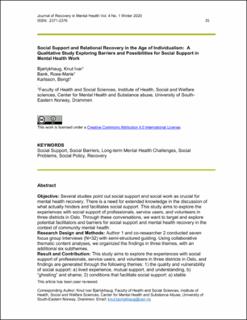Social Support and Relational Recovery in the Age of Individualism: A Qualitative Study Exploring Barriers and Possibilities for Social Support in Mental Health Work.
Peer reviewed, Journal article
Published version
Permanent lenke
https://hdl.handle.net/11250/2735522Utgivelsesdato
2020Metadata
Vis full innførselSamlinger
Originalversjon
Bjørlykhaug, K. I., Bank, R.-M., & Karlsson, B. (2020). Social Support and Relational Recovery in the Age of Individualism: A Qualitative Study Exploring Barriers and Possibilities for Social Support in Mental Health Work. Journal of Recovery in Mental Health, 4(1). https://jps.library.utoronto.ca/index.php/rmh/article/view/35284Sammendrag
Objective: Several studies point out social support and social work as crucial for mental health recovery. There is a need for extended knowledge in the discussion of what actually hinders and facilitates social support. This study aims to explore the experiences with social support of professionals, service users, and volunteers in three districts in Oslo. Through these conversations, we want to target and explore potential facilitators and barriers for social support and mental health recovery in the context of community mental health. Research Design and Methods: Author 1 and co-researcher 2 conducted seven focus group interviews (N=32) with semi-structured guiding. Using collaborative thematic content analyses, we organized the findings in three themes, with an additional six subthemes. Result and Contribution: This study aims to explore the experiences with social support of professionals, service users, and volunteers in three districts in Oslo, and findings are generated through the following themes: 1) the quality and vulnerability of social support: a) lived experience, mutual support, and understanding, b) “ghosting” and shame; 2) conditions that facilitate social support: a) stable environments and room for diversity, b) social rhythm and healing rituals; and 3) conditions that hinder social support: a) economic barriers, and b) social challenges in contemporary society. Conclusion: We found that stable environments, social rhythm, and healing rituals were important facilitators for boosting different layers of social support and mental health recovery. Crucial barriers for social support were connected to poor economy, the socio-economic challenges the services face, and feelings of shame related to struggle with mental health. In our discussion, we invite our readers to relate to and reflect on the findings in view of emerging socio-cultural trends and the ongoing pandemic.

